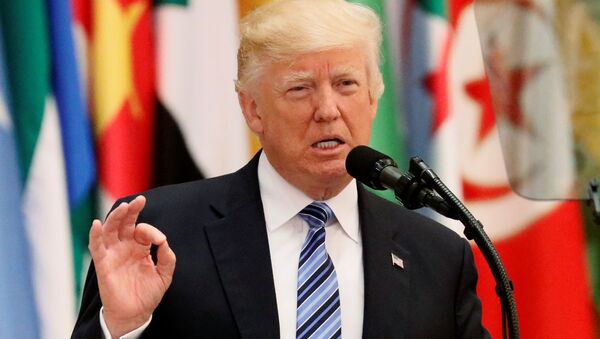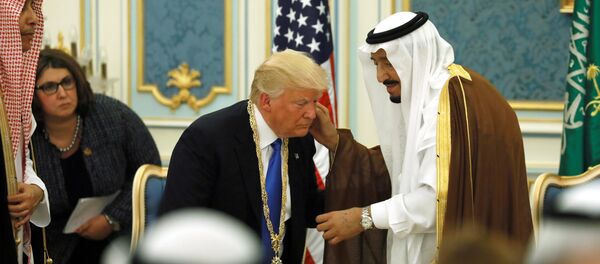On May 20, the president arrived in the Saudi capital of Riyadh with an agenda of discussion points ranging from how the US government and its regional allies can stem the flow of al-Qaeda-inspired terrorism throughout the region, and what steps can be taken to confront what is seen as the growing regional hegemony of the Islamic Republic of Iran.
#RiyadhSummit #POTUSAbroad🇺🇸 pic.twitter.com/WdDEOiV6oS
— Donald J. Trump (@realDonaldTrump) May 21, 2017
After the President and some of his entourage — namely Secretary of State Rex Tillerson — were videoed, rather awkwardly, partaking in a traditional ceremonial sword dance, both sides got down to discussions.
At his landmark speech to officials from across the Gulf region — bar Iran — and the ruling royal family, Trump adumbrated a number of issues on which he would like to strengthen bridges between the US and the Gulf Kingdom.
Chief among them was cooperation on counterterrorism.
"This is not a battle between different faiths, difference sects, or difference civilizations. This is a battle between barbaric criminal who seek to obliterate human life, and decent people of all religions who seek to protect it. This is a battle between good and evil," Trump said.
He also appealed to have a pervasive concern among Sunni Gulf states about the rise of Iran, and the perceived ineluctable threat that this poses to the security of their countries. "For decades, Iran has fueled the fires of sectarian conflict and terror. It is a government that speaks only of mass murder, vowing the destruction of Israel, death to America, and ruin for many leaders and nations in this room."
#POTUSAbroad in Riyadh, Saudi Arabia
— The White House (@WhiteHouse) May 22, 2017
See more at https://t.co/HwWT5vo2Dg pic.twitter.com/DDnRURa5Oo
As was expected before the trip, Trump announced the sale of US$110 billion worth of weapons to Saudi Arabia which includes "tanks and helicopters for border security ships for coastal security, intelligence-gathering aircraft, a missile-defense radar system and cybersecurity tools."
It comes as part of a 10-year US$350 billion agreement in a "strategic vision" between the two countries.
The deal is widely seen by analysts as an attempt by the Trump administration to bolster both the defensive and offensive capabilities of its Gulf state allies, namely as a reminder to Iran that the Gulf monarchies have the military backing of the United States.
However the deal has not gone without its critics, even among US allies. Israel expressed a degree of concern on Sunday, May 21, after the arms deal was signed. Although Israel and the Gulf states share a concern in Iran, Israel has always maintained the qualitative military edge over its Arab neighbors, and has historically expressed concern over lavish arms sales that could narrow that gap in military capability.
"This is a matter that should really trouble us," Israeli Energy Minister Yuval Steinitz said of the deal.
The arms deal has been in the pipeline now for some time, but the White House continued to push to finalize the deal in time to announce it during the president's trip to Saudi Arabia.
It appears that the move was strategically timed to send a message: Trump is doing things different to Obama.
On the sidelines of the meeting, President Trump stepped up his courtship with Egyptian President Abdel Fattah el-Sisi, saying that he intends to visit Cairo soon and declaring that "safety seems to be very strong in Egypt." The two leaders spoke of "fighting terrorism" together, but gave little indication as to how they intend to do so.
As Trump heads on to Israel with the purported intention of breathing life back into the stagnated Israel-Palestine peace process, he leaves behind in Riyadh an emboldened government that no doubt sees its latest US arms purchases as a Trump administration seal of approval for its war in Yemen, and belligerent rhetoric on Iran. In what direction the Trump administration will go from here remains to be seen, but as it stands, there appears to be little more than rhetoric on offer when it comes to the fight against transnational terrorism.




